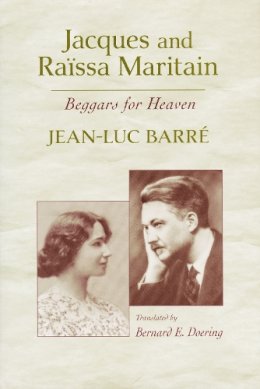Jean-Luc Barré, a journalist and historian, is the author of several books, including Le Seigneur-Chat: Philippe Berthelot, 1866–1934. Bernard E. Doering (1924–2016) was professor emeritus of Romance languages and literatures at the University of Notre Dame.
“Contrary to popular opinion that holds that most of the affairs of day-to-day life are seen as neutral with respect to religious belief, he finds 'that religious belief is the most powerful and influential belief is the world' and that it 'has the single most decisive influence on everyone's understanding of the major issues of life ranging across the entire spectrum of human experience. . . . This new edition has been completely revised and updated by the author.” —Theology Digest “This is a fine book, a pleasure to read, nicely translated by Bernard E. Doering of Notre Dame. The focus is on the lives of two remarkable people with general information about their thought.” —Cistercian Studies Quarterly “Barré's narrative is so wonderfully stirring and multifaceted that it generates its own lacunae in the minds of readers. . . [who] owe Bernard Doering a deep debt of gratitude for a superb translation.” —The Catholic Historical Review "Much has been written on Maritain, perhaps the most influential French theologian of the twentieth century, but now we have a masterly biography that details what was so important for him, the inner life, the working of the soul. . . . this book is a magnificent achievement: would we had the same quality biographical work for de Lubac and von Balthasar." —Ecclesiastical History "Bernard Doering has done an extremely admirable job translating Barré's prose. . . Barré's book serves as a good foundation. His extensive use of the Maritain archives at Kolbsheim will doubtless aid future scholars." —Religion and Literature "First published ten years ago, this was the first true biography of Jacques Maritain, and it has had no rivals since. . . His complete works in French have been published, and there is an English collected works in progress. Barré's biography has given new stimulus to this welcome longevity, and Bernard Doering has put us in his debt with his elegant translation." —First Things "Jacques and Raissa were confidantes of artists (including Georges Roualt and Marc Chagall) and poets, but most of all they were champions of a Thomist philosophy that engaged the hopes and fears of their contemporaries. And yet Jean-Luc Barré's extraordinary telling of their story, only very recently available in English, is anything but a philosophical biography. From start to finish, it is a story of this devoted pair as 'beggars for heaven,' as a husband and wife who were passionate about the salvation of souls." —New Oxford Review "For those who have known Raïssa chiefly through Jacques and Jacques through his books, this substantial account of their lives will introduce a man and a woman passionate in their causes, prayerful in all circumstances and intrepid in the integrity of their humanism." —America "Jean-Luc Barré's book is an important contribution to understanding Jacques and Raïssa Maritain, and it has been rightly recognized as providing insights into the life and character of a couple who, for a time, seemed to have their finger on the pulse of intellectual life and culture in mid-twentieth century western Europe and the Americas." —Notre Dame Philosophical Reviews "[Jacques and Raïssa Maritain's] lives spanned the period running from the Dreyfus case in 1894 to the death of Jacques Maritain in 1973. And since they had been involved, personally and intellectually, in all the agitations of this momentous period in both French and world history, this account of their lives offers a fascinating panorama of the clashing ideas and ideals that still echo in our own time." —The New Republic

